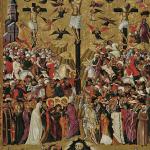We’re blogging through St. Thomas Aquinas’ Compendium Theologiae, sometimes called his Shorter Summa. Find the previous posts here.
We’ve established that God is eternal and everlasting and unchanging; and now Thomas himself shows what that means: there is now this, and then this, and then that in God, not in the sense of things happening one after another in time.
Clearly, therefore, no succession occurs in God. His entire existence is simultaneous. Succession is not found except in things that are in some way subject to motion; for prior and posterior in motion cause the succession of time. God, however, is in no sense subject to motion, as has been shown. Accordingly there is no succession in God. His existence is simultaneously whole.

It’s said that time is the measure of change: it’s because things can change, one thing after another, that we experience time. But God is changeless.
Thomas often uses the words prior and posterior, which simply mean coming before and coming after, not necessarily in time but according to some order of existence. The number 1 is clearly prior to the number of 2, and 2 is clearly posterior to 1, according to the order of the counting numbers; but it would be nonsense to say that the number 1 comes before 2 in the succession of events in time.
It’s important to keep this in mind, because it will turn out that there are prior and posterior in God, in a way; but not in the way that one thing happens after another.
Again, if a being’s existence is not simultaneously whole, something can be lost to it and something can accrue to it. That which passes is lost, and what is expected in the future can be acquired. But nothing is lost to God or accrues to Him, since He is immutable. Therefore His existence is simultaneously whole.
By “simultaneously whole,” I take Thomas to mean that God is what He Is, fully and completely, at every moment in time. If He were not, then at some point He must needs gain something or lose something; but Thomas has shown that God must be changeless.
From these two observations the proper meaning of eternity emerges. That is properly eternal which always exists, in such a way that its existence is simultaneously whole. This agrees with the definition proposed by Boethius: “Eternity is the simultaneously whole and perfect possession of endless life.”
It may seem that Thomas is taking unnecessary pains, here: that he’s already shown this, that he’s flogging a dead horse. But these matters are both abstract and difficult, and misjudging a fine distinction in meaning early on can lead to significant errors and confusion later on. And in fact, these matters are far more complex than Thomas is letting on here; these aren’t proper arguments, they aren’t even really sketches of arguments such as you’d see in the Summa Theologiae; they are pointers to where the argument lies.












